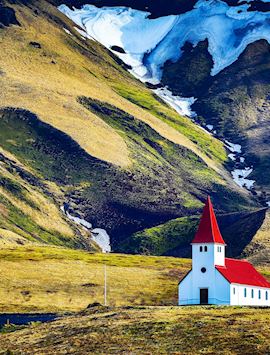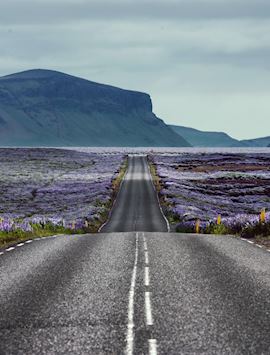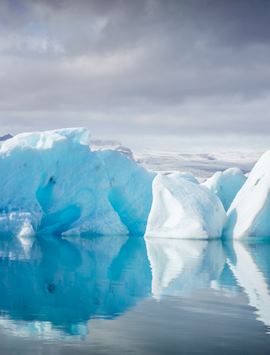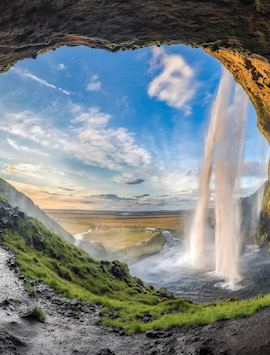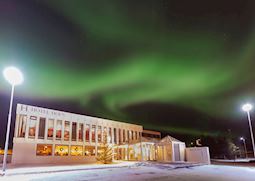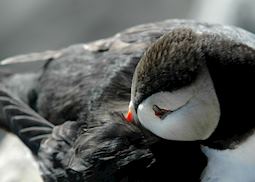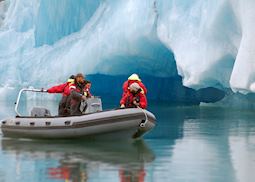Jump to:
A vast region encompassing massive ice caps, thundering waterfalls, glaciers, canyons, craters and volcanoes, Vatnajökull National Park is Europe’s largest and covers 14% of Iceland. However, its distance from Reykjavík means it sees far fewer visitors than the region around the capital, making a trip here a chance to experience the Icelandic wilderness in all its glory. You can enjoy the park via backcountry hiking, 4x4 touring, glacier visits and trips to ice caves.
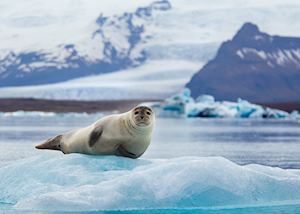 The park was established in 2008 when the Vatnajökull ice cap was added to two existing national parks, Skaftafell and Jökulsárgljúfur, to create the 14,141 sq km (5,460 sq miles) Vatnajökull National Park. Along with Europe’s largest glacier outside the Arctic, the park also encompasses several volcanic peaks, Jökulsárgljúfur Canyon and the thundering Dettifoss waterfall, the massive cliffs at Ásbyrgi, and the glacial tongues that drive their way between some of Iceland’s highest peaks.
The park was established in 2008 when the Vatnajökull ice cap was added to two existing national parks, Skaftafell and Jökulsárgljúfur, to create the 14,141 sq km (5,460 sq miles) Vatnajökull National Park. Along with Europe’s largest glacier outside the Arctic, the park also encompasses several volcanic peaks, Jökulsárgljúfur Canyon and the thundering Dettifoss waterfall, the massive cliffs at Ásbyrgi, and the glacial tongues that drive their way between some of Iceland’s highest peaks.
Everywhere you go in the park, you can see the extraordinary power of nature. Volcanic and geothermal activity, glacial ice and powerful rivers shape the land into strange formations. Five visitor hubs offer access information and advice on how to travel safely in the park, most of which is untouched wilderness only accessible in specific areas. Although the limited lowland areas are relatively easy to reach for experienced and well-prepared hikers, you’ll need a qualified guide to visit highland or glacial areas of the park.
Skaftafell is one of the most accessible areas of the national park, and the most popular destination for independent hiking with a network of trails leading far into the wilderness. One of the most impressive sights is the waterfall at Svartifoss, which is framed by a wall of black basalt hexagonal columns. You can take a guided hike up onto the glacier with crampons and ice axes, or in winter, visit the glittering ice caves deep inside it.
Skaftafell is about a four-hour drive from Reykjavík but can still get busy in mid-summer. However, once you venture a little further from the national park offices, the crowds quickly dissipate.
Elsewhere in the park, you’ll find the Lakagígar crater row, an eruptive fissure consisting of 130 craters that can be seen on a trip from Skaftafell. Caused by a devastating volcanic eruption in the late 18th century, it is an otherworldly landscape that can be visited by Superjeep tours or, between June and August, on a scenic flight. Flightseeing trips offer one of the best ways to see the park’s highlights, take in the dramatic landscapes created by millennia of volcanic activity and the scale of the glaciers that flow from the ice cap.
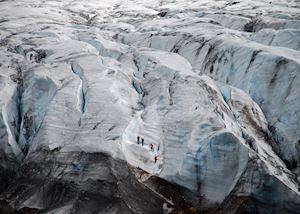 Glacier hiking in south Vatnajökull is possible year-round. Puffin colonies along the south coast provide entertaining wildlife watching, and the glacier lagoon at nearby Jökulsárlón is fed by the Vatnajökull ice cap.
Glacier hiking in south Vatnajökull is possible year-round. Puffin colonies along the south coast provide entertaining wildlife watching, and the glacier lagoon at nearby Jökulsárlón is fed by the Vatnajökull ice cap.
The northern end of the park is far more remote and more difficult to access, though you can take a guided Superjeep tour into the wilds of the highland interior to see the volcanic scenery or hike along deserted trails around Kverkfjöll and Snaefell.
North of the main protected zone and disconnected from the rest of Vatnajökull National Park, is another section of park which protects the Jökulsárgljúfur Canyon, the thundering Dettifoss waterfall and the massive cliffs at Ásbyrgi, but these areas must be accessed from the ring road on the northern side of the island.
Best time to visit Vatnajökull National Park
Vatnajökull National Park can be visited at any time of year, although there are more visitors in the summer months between June and August. From May to September, you’ll experience extra-long days and generally warmer, drier weather, which makes for better hiking conditions.
who's been there

Start planning your tailor-made trip to Vatnajökull National Park by contacting one of our Iceland specialists
-
617-223-4521617-223-4198
- Make an inquiry
Suggested itineraries featuring Vatnajökull National Park
Our itineraries will give you suggestions for what is possible when you travel in Vatnajökull National Park, and they showcase routes we know work particularly well. Treat them as inspiration, because your trip will be created uniquely by one of our specialists.
Places near Vatnajökull National Park
- ´łĂ¶°ěłÜ±ô˛őá°ů±ôĂł˛Ô 41 miles away
- South Iceland 71 miles away
- Lake Mývatn 77 miles away
- Akureyri 87 miles away
- Dettifoss 92 miles away
- Eastfjords 93 miles away
- ł˘˛ą˛Ô˛µÂáö°ěłÜ±ô±ô 96 miles away
- Golden Circle 101 miles away
- South Coast 102 miles away
- North Iceland 118 miles away
- Westman Islands 124 miles away
- Troll Peninsula 126 miles away
- West Iceland 134 miles away
- ¸é±đ˛â°ěÂᲹ±ąĂ°ě 150 miles away
- Blue Lagoon 170 miles away
- Southwest Iceland 170 miles away
- Snæfellsnes Peninsula 183 miles away
- Flatey 183 miles away
Photos of Vatnajökull National Park
Accommodation choices for Vatnajökull National Park
We've selected a range of accommodation options for when you visit Vatnajökull National Park. Our choices usually come recommended for their character, facilities and service or location. Our specialists always aim to suggest properties that match your preferences.
-
![Hótel Höfn, Höfn]()
Hótel Höfn
Vatnajökull National Park
Ideas for experiencing Vatnajökull National Park
Our specialists seek out authentic ways to get to know the places that could feature in your trip. These activities reflect some of the experiences they've most enjoyed while visiting Vatnajökull National Park, and which use the best local guides.
-
Small group puffin tour at Ingólfshöfði ![Puffin]()
Small group puffin tour at Ingólfshöfði
Small group puffin tour at Ingólfshöfði
Take a trip to an isolated headland to observe puffins in a remote location overlooking black sands and steely ocean. With sweeping views, a fun tractor ride across sandy marshes, and relatively easy hiking, it’s a worthwhile way to spend a day.
View details -
Jökulsárlón Zodiac boat tour ![´łĂ¶°ěłÜ±ô˛őá°ů±ôĂł˛Ô Glacier Lagoon tour by Zodiac]()
´łĂ¶°ěłÜ±ô˛őá°ů±ôĂł˛Ô Zodiac boat tour
´łĂ¶°ěłÜ±ô˛őá°ů±ôĂł˛Ô Zodiac boat tour
Hop on a boat to weave among the icebergs on the glacial lagoon at ´łĂ¶°ěłÜ±ô˛őá°ů±ôĂł˛Ô. Examine their ever-changing forms, learn about local geography and get up close to some of the many seals that make the lagoon their home.
View details

